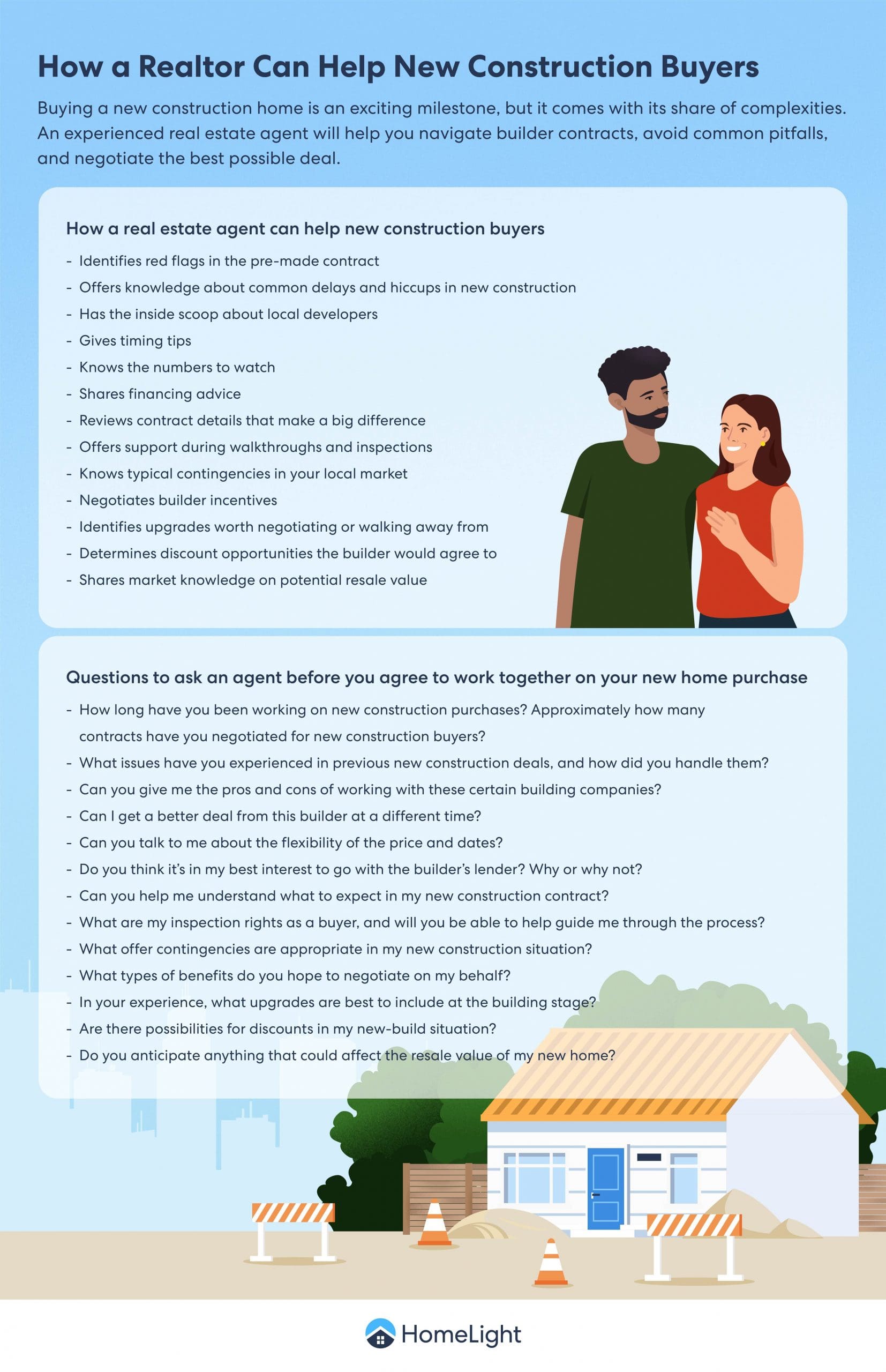Yes, You Need A Real Estate Agent To Buy a New Construction Home! Here’s How to Find One
- Published on
- 11 min read
-
 Melissa Holtje, Contributing AuthorClose
Melissa Holtje, Contributing AuthorClose Melissa Holtje Contributing Author
Melissa Holtje Contributing AuthorMelissa enjoys using her experience as a house flipper, investment buyer, and waterfront home owner to help buyers and sellers thrive in the housing market. When not scouting real estate, you’ll most likely find her at the beach.
-
 Jedda Fernandez, Associate EditorClose
Jedda Fernandez, Associate EditorClose Jedda Fernandez Associate Editor
Jedda Fernandez Associate EditorJedda Fernandez is an associate editor for HomeLight's Resource Centers with more than five years of editorial experience in the real estate industry.
You’re buying a house, and this time, you’re going to be the very first household to occupy this space; it’s brand-new construction. Now you’re asking yourself: Do you really need to hire a real estate agent for a new construction home?
Short answer: Yes, you do.
Benefits of having a real estate agent for new construction
Maria Walley, a real estate agent who works with new construction purchases in Cincinnati, Ohio, says that there’s really no downside to having an agent in your corner as a buyer.
“When you’re buying new construction, you want an agent who will fight for you and be your advocate. And the builder won’t give you a better deal if you don’t bring an agent — you’ll just be unrepresented.”
How a Realtor can help new construction buyers
Working with a real estate agent sets you up for the best new construction purchase process. But not all real estate agents are up to the task. Here’s what you should ask an agent before you agree to work together on your new home purchase.
Identifies red flags in the pre-made contract
Buying new construction is a little bit different than the purchase of an existing home, so you need someone who has handled this specific type of sale.
The builder’s agent usually has a pre-made contract drawn up, but that contract will naturally favor the builder. Your agent needs to know which red flags to watch for; they need to be confident in negotiating on your behalf. This can only come through experience.
Question to ask your agent: “How long have you been working on new construction purchases? Approximately how many contracts have you negotiated for new construction buyers?”
Offers knowledge about common delays and hiccups in new construction
Many new-build projects have a certain number of hiccups throughout the process. Supply delays, labor disputes, weather challenges, financing problems — there’s no shortage of elements that can affect your home’s completion.
Talk to your potential agent about what challenges they’ve encountered in previous new construction deals, and ask about how they solved these problems for their clients. Getting their insight will not only help you be prepared for future issues, but it can also help you determine if they’re truly the best agent to represent you in this deal.
Question to ask your agent: “What issues have you experienced in previous new construction deals, and how did you handle them?”
Has the inside scoop about local developers
Chances are you’ve got a few major players in your local real estate development game. An experienced agent or broker will have knowledge of each company and will be able to give you their general impressions. Is there one builder that is easier to work with than another?
Walley says that a real estate agent may be able to connect you with colleagues or prior clients who have worked with the builder that you’re considering. You can ask their thoughts about timeliness, quality, and professionalism.
You could also ask about a builder’s stated policies, such as deposits and cancellations. The agent should be able to explain these policies to you and help you compare the terms.
Question to ask your agent: “Can you give me the pros and cons of working with these certain building companies?”
Gives timing tips
National building companies have financial benchmarks that they have to report to their shareholders. To meet certain quotas, the builder may sometimes offer buyer incentives toward the end of a quarter or the end of the year.
Most often, those incentives equate to deals on upgrades or more favorable contract terms rather than a price reduction. But if waiting a few weeks might get you those swoon-worthy light fixtures, wouldn’t you like to know?
A real estate agent with local new construction expertise will be able to tell you if there’s a better (or worse) time to buy from a specific builder.
Question to ask your agent: “Can I get a better deal from this builder at a different time?”
Knows the numbers to watch
At the end of the day, two numbers make all the difference in a new construction home purchase: the price and the completion date.
Many building companies are unwilling to budge much from the list price of the home — selling at a lower price sets a bad precedent for future sales. Still, your potential agent may know whether a builder has been able to accommodate some wiggle room in the price before, or they might be able to advise you on which upgrades you’ll be able to negotiate for in order to make that bottom line price more attractive.
You’ll also want to get your potential agent’s expert opinion on whether or not a certain builder has a history of sticking to their completion dates. Obviously, no one has a (working) crystal ball, but asking about track records can be an indicator of the timeliness of your build.
Be sure to ask about the firmness of the “days to close” number as well. Often, this is a function of financing, inspections, and building combined, but an experienced agent will be able to tell you the likelihood that the number will stick.
Question to ask your agent: “Can you talk to me about the flexibility of the price and dates?”
Shares financing advice
Sometimes, a builder prefers to work with a specific lender. Because they assume some risk when building a home, having a trusted lender helps streamline their processes.
But that doesn’t always mean that the builder’s preferred lender is the best fit for you. For example, they may offer nice credits toward closing costs, but the interest rate may be higher, which could mean you pay more in the long run.
Ask your potential agent how they would help you navigate the loan arena, what pitfalls you should look out for, and if they can refer you to other lenders.
Question to ask your agent: “Do you think it’s in my best interest to go with the builder’s lender? Why or why not?”

Reviews contract details that make a big difference
Contracts for new construction should include a few basic things. Talking to your potential agent about these bare-bones items now can give you more confidence that they’ll be able to explain more detailed contract items later.
- Escrow amount. Usually, a builder requires a much larger sum than a resale home due to increased customization risk. What is standard and fair in terms of escrow in your area?
- Timing. What time frame is normal for your size of home? What kind of delivery dates and design choice dates should you expect? Also, ask how the agent plans to help you keep track of due dates.
- Financing. Sometimes, builders will request multiple payments throughout a project. Is this standard and fair for your situation? What is the fallout of not obtaining financing on time?
- Materials. Inquire about the probability (necessity!) of defining certain material standards in the contract. If you’re expecting hurricane windows and you get double pane, what action can be taken?
- Disputes. No one wants conflict with their builder, but sometimes it happens. Can the agent advise you on contractual protection in the case of disputes?
Walley says that it’s also important to ask about any HOA bylaws that may be present in a new neighborhood. An agent should be able to help you obtain and review those requirements before you get too far along in the process.
Question to ask your agent: “Can you help me understand what to expect in my new construction contract?”
Offers support during walkthroughs and inspections
Throughout the building process, numerous inspections must be passed, both for code and zoning approval purposes. Talk to your agent about what inspections you’ll be able to attend and what you should be looking for at each stage in general. Will they be there to help you navigate these inspections?
You may also want to touch on the final walkthrough inspection, even though that’s likely a long time away. Ask the agent what you can expect if the final product is not delivered to standard.
Question to ask your agent: “What are my inspection rights as a buyer, and will you be able to help guide me through the process?”
Knows typical contingencies in your local market
Some common offer contingencies don’t really go over well in a new construction scenario.
For instance, a builder might not want to take your offer if it’s contingent upon the sale of your current home; it puts them in a situation of greater risk to start construction if the sale might not go through.
Talk to your potential agent about the typical and atypical contingencies in your local new construction market. Contingencies could include financing, appraisal, inspection, military orders, job offers, or the sale of a current home. What might the builder accept or reject as a contingency? If a certain contingency is important to you, ask the agent about how to make your offer more competitive in other areas.
Question to ask your agent: “What offer contingencies are appropriate in my new construction situation?”
Negotiates builder incentives
Negotiating power is the No. 1 reason why you need your own buyer’s agent. You want someone who’s going to be exclusively in your corner. So, what does this particular agent recommend when it comes to the new construction negotiations?
Again, most builders have very little room to move on the list price, but your agent should be able to offer some suggestions regarding ways to “sweeten the deal” in your favor. Upgrades, additions, closing credits, warranties — the agent should have a negotiation game plan.
Question to ask your agent: “What types of benefits do you hope to negotiate on my behalf?”
Identifies upgrades worth negotiating or walking away from
On average, new construction buyers spend about 10%-20% of their total home price on builder upgrades, though the actual figure varies greatly depending upon the locale. But, builders charge a significant premium for upgrades, so how is a new homebuyer supposed to decide which upgrades are worth the money? By asking their agent, of course!
Though upgrades certainly come down to personal preference and taste, your real estate agent can offer advice regarding which upgrades should take priority now versus which can be done later.
For example, wood flooring usually comes with a big upcharge at the building stage because it requires a lot more installation work. You could save as much as $8 per square foot by laying the flooring yourself over time. Instead, at the building stage, you might want to opt for a premium carpet pad to make floors more comfortable in the meantime.
Question to ask your agent: “In your experience, what upgrades are best to include at the building stage?”
Determines discount opportunities the builder would agree to
If you’re on a tighter budget, ask your potential agent what advice they can give you about how to spend less for more. Perhaps a builder might be more apt to offer a price reduction on a model home or an inventory home that’s been sitting on the market for a while.
Maybe there’s a way to leave certain things out of the contract in favor of others. For instance, if you’re willing to do the landscaping yourself, could your agent get a discount on that premium appliance package? It might be worth asking!
Question to ask your agent: “Are there possibilities for discounts in my new-build situation?”
Shares market knowledge on potential resale value
It may seem premature to talk about selling a house before you’ve even bought it. But the truth is, you’re going to need to be prepared for the eventuality of letting go of your new home.
What does this potential agent think about the market around your neighborhood? A good agent should be aware of new developments on the horizon that could impact the value of your home later. Pick their brain!
Walley mentions the resale expertise that an agent brings in terms of design choices as well. “I think a Realtor can help with selections, making sure that what you buy will be okay for resale in a few years.”
Question to ask your agent: “Do you anticipate anything that could affect the resale value of my new home?”
Buying a new home is a big deal. You deserve an agent who’s going to advocate for you every step of the way. You may want to consider interviewing a HomeLight real estate agent who has proven experience in the new construction sector.
Do your homework and walk into your new construction purchase confidently — with your agent!
Header Image Source: (paulbr75 / Pixabay)




